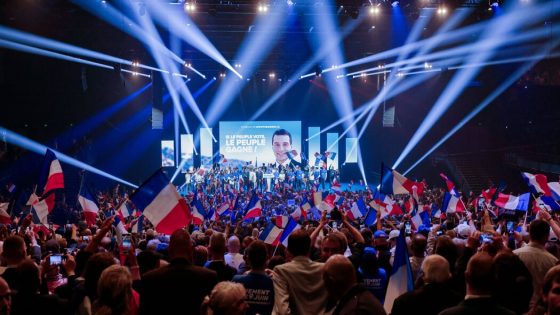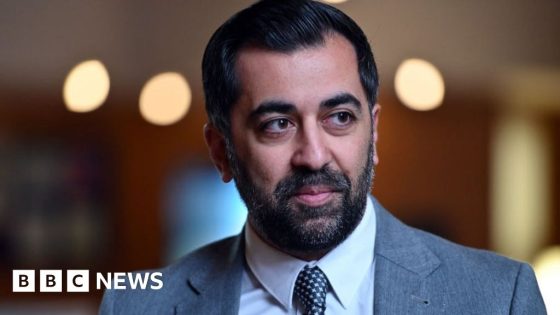France has a taste for revolutions, and in the 28-year-old Jordan Bardella, it has found a mild-mannered, impeccably dressed insurgent who vows to upend the politics of the country in order to save it from “disappearance.”
Mr. Bardella, the president of the National Rally, is the cherished disciple of Marine Le Pen, 55, the perennial far-right presidential candidate. She once called him the “lion cub”; now she calls him “the lion.” A clean-cut, strong-jawed TikTok star, known for his love of candy, he has certainly shown a sure hand in the French political jungle.
As European Parliament elections approach on Sunday, Mr. Bardella, who led his party’s campaign, seems poised for a victory that could reshape French politics. An Ipsos poll published this past week gave the National Rally some 33 percent of the vote, more than double the 16 percent of President Emmanuel Macron’s centrist Renaissance party.
Even if the effective power of the European Union’s only directly elected body is limited, this would be a stark repudiation of the French leader. As elsewhere in Europe, the normalization of the far right has proceeded apace.
It is as if a fractured France, weary of politics as usual and anxious about its future, has abruptly discovered a more acceptable version of the xenophobic politics that long cast the National Rally as a direct threat to French democracy. It has helped that Mr. Bardella is young, possesses a reassuring showmanship and does not bear the name Le Pen.
Indeed, his success has been such that a leadership battle looms. For now, Ms. Le Pen and her prodigal son are a hugging and seemingly harmonious duo (Mr. Bardella dates Ms. Le Pen’s niece Nolwenn Olivier). But Mr. Bardella’s popularity is such that there is a possibility the wunderkind will eclipse his maker.
Ms. Le Pen retains the stubborn hope of becoming president in 2027, when Mr. Macron’s term ends. She has said she would make Mr. Bardella her prime minister if she became president.
“The moderate conservative right is dead in France, and, for the first time, it is possible that the National Rally will come to power,” said Jean-Yves Camus, a political scientist who studies nationalist movements in Europe.
Raised by his mother, an Italian immigrant, in the projects north of Paris, Mr. Bardella marks a break from the cookie-cutter technocrats formed in elite schools who have dominated French politics. He has recast — some would say sugarcoated — the angry message of the nationalist right so effectively that there is talk of “Bardellamania.”
“Our civilization can die,” Mr. Bardella told a crowd of more than 5,000 flag-waving supporters this past week, as chants of “Jordan! Jordan!” reverberated around a vast arena in Paris. “It can die because it will be submerged in migrants who will have changed our customs, culture and way of life irreversibly.”
Mr. Bardella’s campaign director, Alexandre Loubet, said that in the event of a clear victory for the National Rally, the party “would demand the dissolution of the National Assembly” and new elections. “If Mr. Macron has a minimum of respect for the will of the French people,” Mr. Loubet said, “he would do so.”
Mr. Macron, who is term-limited and has three more years in office, is unlikely to do any such thing, no matter the outcome.
In Mr. Bardella’s telling, always delivered in a level tone, Mr. Macron has brought France to the abyss through rampant immigration, a lax approach to lawlessness and violence, the loss of French identity, and “punitive” ecological change that makes life unaffordable.
“Everything is going from bad to worse,” said Alain Foy, a concierge who attended Mr. Bardella’s rally in Paris. “Sometimes I can’t believe what is happening, whether on immigration, purchasing power, insecurity, everything.” His sister, Marie Foy, added, “France is falling apart.”
Mr. Foy said that in the past, anyone disagreeing with the National Rally would quickly label Ms. Le Pen a racist or a fascist. “But with Bardella,” he said, “the good thing is that he thinks the same, but they can’t call him a racist because he’s an immigrant child of Italian parents.”
The exact nature of Mr. Bardella’s upbringing in the Seine-Saint-Denis suburb is unclear. He has portrayed it as a childhood of unrelenting hardship in projects afflicted by drug dealing and violence, where you could be killed for refusing someone a cigarette, and where his mother, who separated from his father when he was 1, struggled to make ends meet.
However, Mr. Bardella attended a private school, the Lycée Saint-Jean-Baptiste-de-la-Salle, where the fees were paid by his father, who had a small business renting coffee and vending machines, said Pascal Humeau, who was close to Mr. Bardella for many years.
Mr. Bardella proved to be a good student with strong political convictions, and in 2012, at age 16, he enrolled in the party he now leads, which was then called the National Front. He had interned for a week with the local police precinct, an experience that appears to have contributed to his political orientation.
“It was not a working-class upbringing, that’s clear, but nor was it privileged in any way,” Mr. Camus said. Although he had graduated with distinction from high school, Mr. Bardella dropped out of college to focus on politics, essentially the only work he has done.
With his deliberate manner and his charismatic good looks, he was quickly identified in Ms. Le Pen’s entourage as an ideal representative of a reinvented National Rally, stripped of the anti-Semitic invective of its founder, Jean-Marie Le Pen, who called the Holocaust a “detail” of history.
Ms. Le Pen, intent on bringing her party into the mainstream, pushed him forward. Mr. Humeau, a former journalist, became Mr. Bardella’s media trainer in 2018. In him, he discovered a “rather sad young man, repeating Ms. Le Pen’s formulas, an empty shell, very controlled, but knowing little of what was happening in France or the world.”
Mr. Bardella was, however, a quick study. He learned to smile and appear more relaxed, retaining an air of “consensual humility” before eventually becoming what Mr. Humeau called “the media beast of today who scares his opponents.”
To what end, I asked? “He has had one objective since the age of 17 — to become prime minister and president,” Mr. Humeau said, “and I don’t think anyone can derail him.”
If Mr. Bardella has contrived to present a softer face of the National Rally, then there is little or no evidence that his own views or the party’s have moderated.
Mass immigration — some 5.1 million immigrants entered the European Union in 2022, more than double the number the previous year — is the core issue in the European election, polls show, along with the struggles of French families to make ends meet as the war in Ukraine has driven up energy and food prices.
In this context, the National Rally has successfully portrayed itself as the home of French patriotism, the party of people reasonably concerned that immigration is out of control.
With his Italian background, Mr. Bardella has been able to argue that the issue is not immigration itself, but the refusal of many migrants to assimilate. On the left, the very word patriotism in France tends to be viewed skeptically, a first step to nationalism and even war.
The benefits that immigrants can bring to societies with shrinking labor forces and tax bases are generally overlooked. Instead, the focus of the right is on migrants, particularly North African Muslims, benefiting from handouts and changing the looks, habits and cultures of urban neighborhoods.
“We have the courage and lucidity to say that if France becomes the country of everyone, it will no longer be the nation of anyone,” Mr. Bardella said this past week. “With the deregulation of migration, totalitarian Islamism does not only give its fanatics an order to separate themselves from the French Republic, but also to conquer it, in order to impose its laws and morals.”
Mr. Bardella has accused Mr. Macron of wanting to expand the 27-member European Union to 37 members, including the Turkey “of the Islamist” President Recep Tayyip Erdogan, and of intending to give up France’s veto over E.U. foreign policy decisions.
Turkish E.U. accession talks have in fact long been frozen, and Mr. Macron’s attachment to French sovereignty is fierce. The mildness of Mr. Bardella’s tone can mask a readiness to bend the truth.
He has tried, with vague evasions, to play down his party’s longtime closeness to President Vladimir V. Putin of Russia, a policy now revised, despite the repeated pro-Russian votes of his party in the European Parliament. It voted in 2021 against a resolution in support of Ukraine’s “independence, sovereignty and territorial integrity,” for example.
If Mr. Bardella has been campaigning by raising the specter of the “death” of France, Mr. Macron has also been speaking in apocalyptical terms of late, warning of the “death” of Europe if it does not achieve “strategic autonomy.”
The difference is that Mr. Bardella believes salvation lies in less Europe, not more. The European elections will also be a bellwether of the European idea itself.
“I worry that people won’t vote for Ms. Le Pen because of her name, with her father and all,” said Jacky Laquay, a retired factory worker who recently attended a Bardella rally in the north of France. “Bardella embodies the future of France.”
Certainly, Mr. Bardella appears unlikely to disappear from the political scene soon. “At 28, he has 40 years of political life in front of him,” Mr. Camus said. “That’s not nothing.”
Ségolène Le Stradic contributed reporting.
Source Agencies


